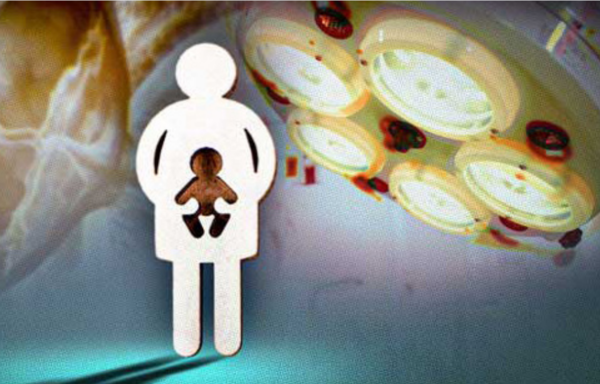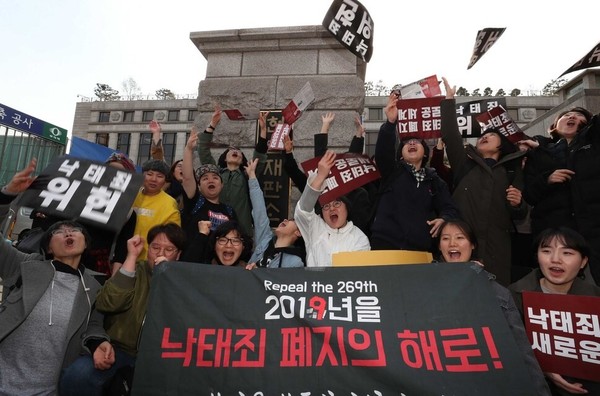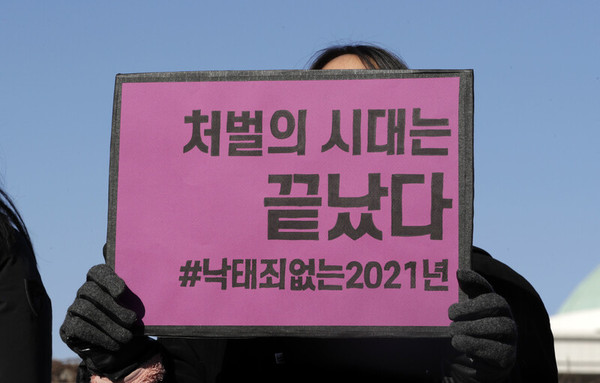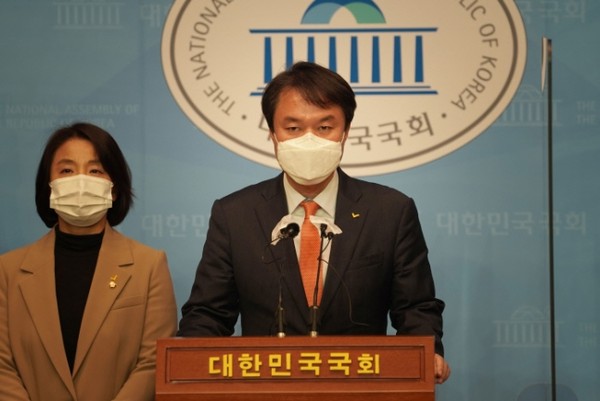
Women's self-determination should be taken for granted. The movement to obtain it was not always easy. In Korea, abortion was once illegal, but despite being illegal, it was sometimes performed. It was done secretly and illegally. It has been a controversial topic for many years and various discussions on abortion at various levels of society continue even today. Though it is now allowed, should it be something considered acceptable in society?

Background on abortion
Abortion is the removal of the fetus from a woman's body prior to natural delivery through artificial means such as with the use of drugs. Article 269 of the Criminal Code states that women who abort their fetuses be sentenced to up to one year in prison or fined 2 million won, and Article 270 states that any medical personnel such as western medicine doctors, oriental doctors, and midwives to be sentenced to up to two years in prison for participating in the abortion. Abortion was not always illegal in Korea. The Mother and Child Health Act prohibits abortion, but it also allows abortion in cases where childbirth could pose a serious threat to the health of the mother as well as cases of sexual assault. In 2021, a new law will terminate the previous law specifying that abortion was an illegal act in Korea. In the Joseon dynasty era when Korea was a Japanese colony, the punishment was often to sentence the pregnant woman to have an abortion under Japanese law. Keeping a similar stance, the Constitution of the Republic of Korea, established abortion laws under its Criminal Code in 1953. Abortion gradually disappeared until the 1970s and mid-1980s when Korea put in place a birth control policy of "Have only one child and raise the child well." In 1985, the Supreme Court ruled abortion procedures carried out by doctors against the social norm, and the court helped create stronger laws against abortion.
Controversy exploded between those who said it violated individual autonomy and those who claimed it violated respect for life. Opponents of abortion claimed abortion restricted the baby's right to be born. In addition, even now, it is still debatable whether an undeveloped fetus is actually alive in the early stages of pregnancy, so abortion discussions center on the fetus' right to life and women's right to control her body. Many felt the country should not control women's right to self-determination. On the other hand, those against abortion present abortion cruelty and claim fetuses are alive. They believe the abolition of abortion laws would result in increased abortions and that it would give rise to a sexually promiscuous world. At present, 25 of 36 OECD member countries allow abortions. In the United Kingdom, France, and Germany, abortion is conditionally permitted depending on the circumstances of the pregnant woman. Among the 50 states in the United States, 43 allow conditional abortion to take place up to 24 weeks of fetal age. Abortion is also allowed in Ireland. Globally, there is a trend to allow women to make abortion decisions on their own.

Members of Women's Organization Feeling Happy about the Judgement of Constitutional Nonconformity In Front of the Court

Long and tough path
It has been a long road towards Korea's legalization of abortion in 2021. A doctor indicted on charges of performing an illegal abortion in 2010 filed a petition with the Constitutional Court to revise outdated laws on abortion, which have not been changed since the Supreme Court ruling in 1985. In 2012, the Constitutional Court ruled the right to life outweighed the right to self-determination by pregnant women. However, abortion laws returned to the Constitutional Court when a gynecologist, who was found guilty of performing an abortion procedure, filed a constitutional petition. The doctor claimed Article 269 of the Criminal Code and Article 270 of the Criminal Code, which stipulated self-abortion and assisted abortion as illegal acts, were unconstitutional.1) On April 11, 2019, the Constitutional Court ruled Article 269(1) of the Criminal Code was an ex post facto law. "Article 269(1) of the Criminal Code must be retroactively changed because it restricts a pregnant woman's right to self-determination beyond the minimum limitation required to achieve legislative purposes." An ex post facto law ruling then judges the illegal status as unconstitutional, but it temporarily recognizes the old law until the current law is revised, fearing confusion caused by the gap in an absence of a law. In other words, in order to minimize confusion caused by the abolition of abortion laws, the law had to be revised by December 31, 2020. The Constitutional Court declared the current clause on punishment for seeking and having an abortion should be revised by and obeyed from December 31, 2020. The National Assembly failed to enact alternative legislation for a year and eight months, so the law stating abortion was illegal automatically expired on January 1, 2021. The Constitutional Court said, "The safety of the pregnant women is as concerning as the safety of the fetus. There is a need to consider the pregnant woman's life as well as the life of the fetus. Both have practical implications when discussing the physical and social protection of pregnant women."2) Unlike the Constitutional Court's decision in 2012, the decision on abortion in 2021 highlights views in the society of a woman's right to self-determination and the fetus' right to life.
Laws that state abortion is illegal have lost all legality by the Constitutional Court. However, this decision does not mean things in society have changed. There is still the need for supplemental legal documents and there will be a number of policy proposals on when abortion will be allowed. The Ministry of Justice announced new legislation specifying the period when abortion would be allowed as an amendment to the Mother and Child Health Act and the Criminal Law. The National Human Rights Commission of Korea announced that the amendment being discussed at the National Assembly maintains the current position of non-criminalizing the suspension of a pregnancy.3) The government is currently seeking alternative solutions such as providing methods to prevent unwanted pregnancies, not punishing women who have an abortion. However, the absence of any laws regarding abortion and the absence of alternatives at the moment means there is no guarantee of a safe abortion. In particular, while revisions to the Mother and Child Health Act include government support for a safe abortion, no concrete decision has been made on.4) Supplementary laws are needed as soon as possible before more problems arise due to the absence of any law.

An unfinished argument
As mentioned earlier, there are still concerns that need addressing regarding abortion. On April 11, 2019, the Constitutional Court ruled against the Constitution on abortion as being a criminal act and recommended alternative legislation be enacted by December 31, 2021. However, the National Assembly failed to create such legislation. Therefore, under Criminal Law, abortion laws automatically expired without alternative or supplementary legislation beginning January 1 of this year. With the legislative vacuum, problems are beginning to rise naturally in society. In particular, because each hospital sets its own costs and time for abortions, there is rising competition. In fact, the cost of the abortion at various maternity hospitals ranges from 600,000 won to 1 million won depending on the pregnancy period. Some hospitals will refuse to perform the operation after more than 10 weeks of pregnancy. One anonymous maternity hospital in Seoul commented, "It is only possible to schedule the termination of a pregnancy when the term has not exceeded 10 weeks of pregnancy."5) That is, despite the abolition of abortion laws, there is, of yet, no specific legislation which is causing confusion at medical facilities.
In addition to hospitals having different standards for allowing abortions, problems have surfaced on the illegal distribution of abortion drugs. Abortion drugs and hospital treatment advertisements are popping up online and causing confusion. One example is the case of the artificial abortion drug Meeffzine. Right now the drugs are being regulated now. However artificial abortion medicines such as meeffzine are being illegally trafficked on SNS. At the moment, there is no abortion medicine approved by the Ministry of Food and Drug Safety. Anyone who searches the key words 'Abortion drug purchase' on an Internet portal site will be lead to 'the price of Miffji', 'the sale of genuine Miffjin', and 'how to purchase abortion medicines'. Caution is needed, especially since many sites present false information. There is one domestic pharmaceutical company currently in discussions with the Ministry of Food and Drug Safety about abortion medicines. The company claims much more time is needed to determine their safety for use. The Ministry of Food and Drug Safety said, "The company is applying for official permission to sell its drugs as a way of abolishing an unwanted pregnancy. It naturally leads to a miscarriage but is based on new ingredients unlicensed in Korea, so time is need, up to 120 days, before permission is given after screening."6) Termination of unwanted pregnancy medicines is not yet legally available in Korea despite it no longer being illegal to have an abolition.


Miffjin search results on social media
The direction forward
Laws making abortion illegal have been abolished on the ruling that it is a woman's right to decide. However, legislative vacuum has brought about different types of surgery methods at hospitals as well as a rise in illegal distribution of abortion medicines. This has brought about different types of surgery methods at hospitals as well as a rise in illegal distribution of abortion medicines. With the absence of any laws on abortion, there is still much work to do. Continuous attention and measures will be needed.
1) Ahn Hui, "The Constitutional Court Pays Attention to the Petition for Abortion Law Reform… 6 of 9 Judges Said There Is a Need to Fix the Law", Yonhap News, November 26, 2017
2) Go Hansol, "'Criminal Abortion' as Constitutional Nonconformity… No Longer the Fault of Women", Hankyoreh, April 11, 2019
3) Kim Mihyang, "2021, Encountering a New World Without Punishment For an Abortion.", Hankyoreh, December 31, 2020
4) Park Chaeyeong, "2021 Without Abortion, Still Much Left to Discuss", Kyunghyang Shinmun, February 17, 2021
5) Park Chaeyoung, "A Month After the Abolition of Abortion...a Lot More Needs To Be Done To Solve the Issue", The Kyunghang Shinmun, February 14, 2021
6) Rye Nanyoung, "Abortion Was Abolished, … Pregnancy Termination Drugs Continue To Be Traded Illegally", NEWSIS, March 2, 2021
Lee Hwang Hayoung / Woman Section Editor
smt_lhy@sookmyung.ac.kr
Kwon Jung Eunseo / Culture Section Editor
smt_kes@sookmyung.ac.kr


